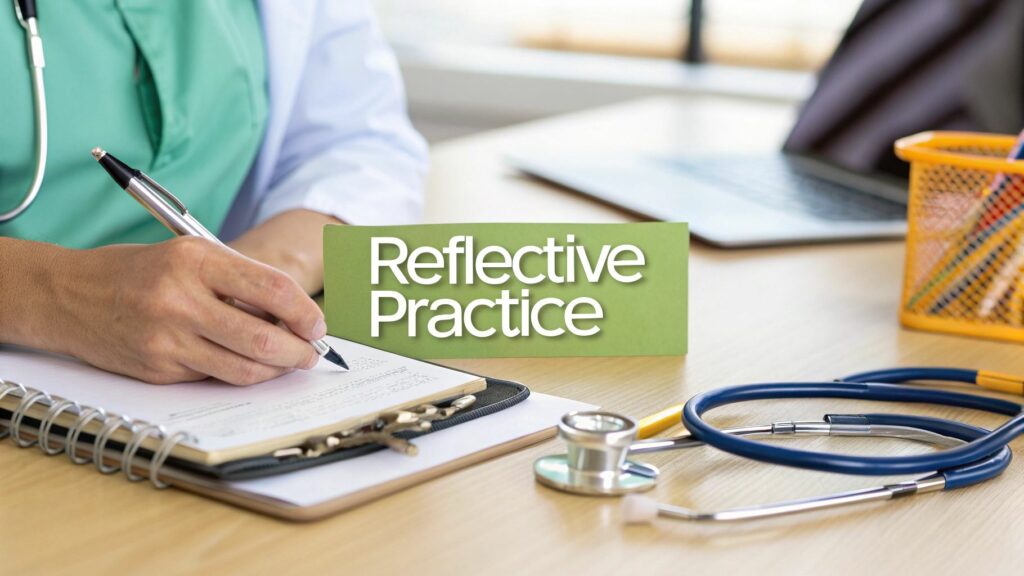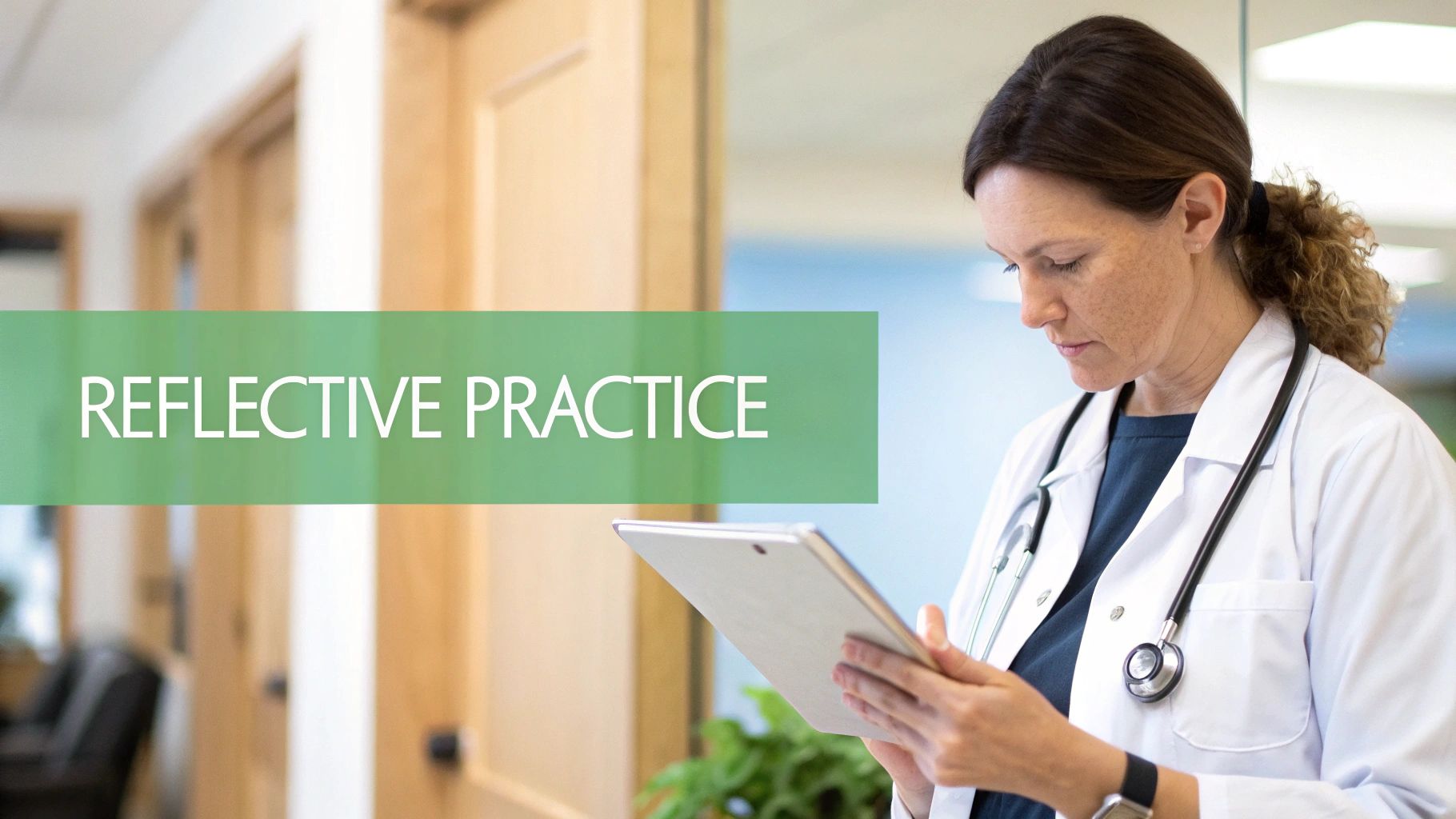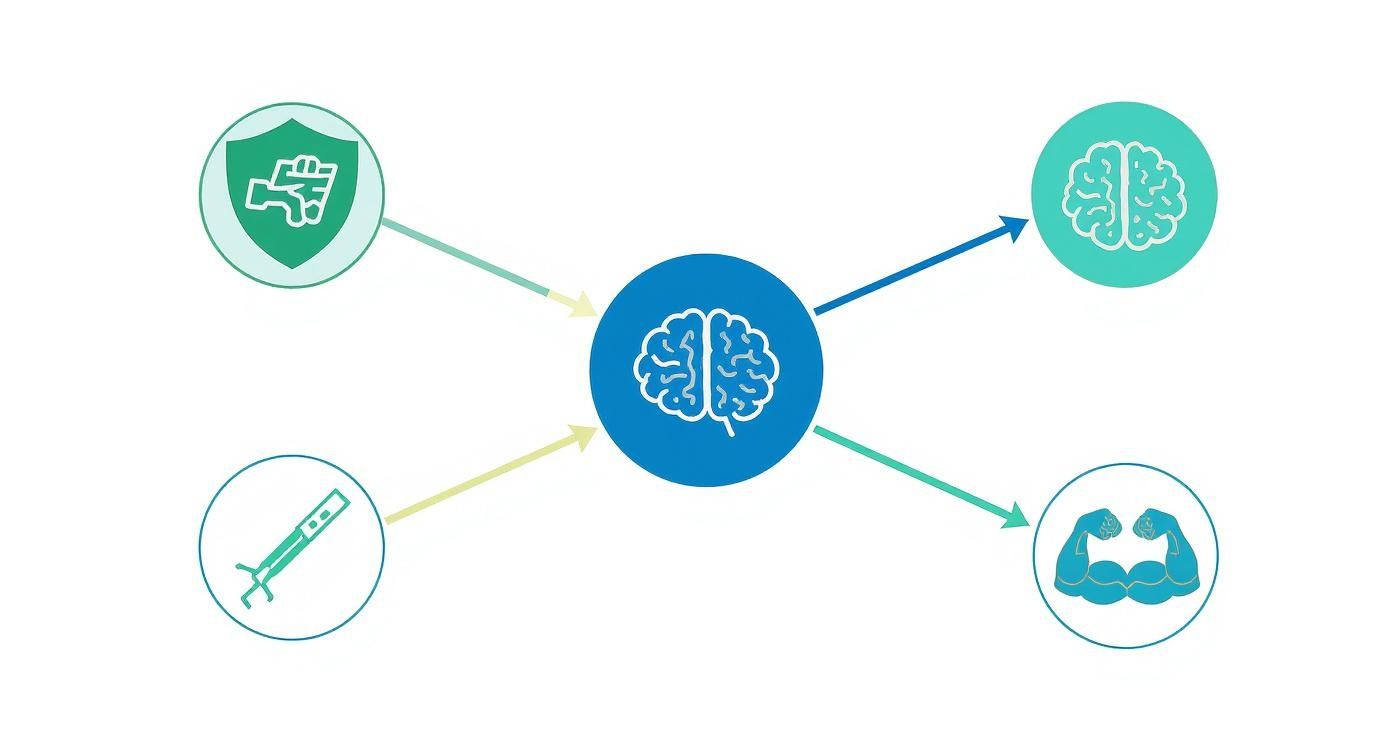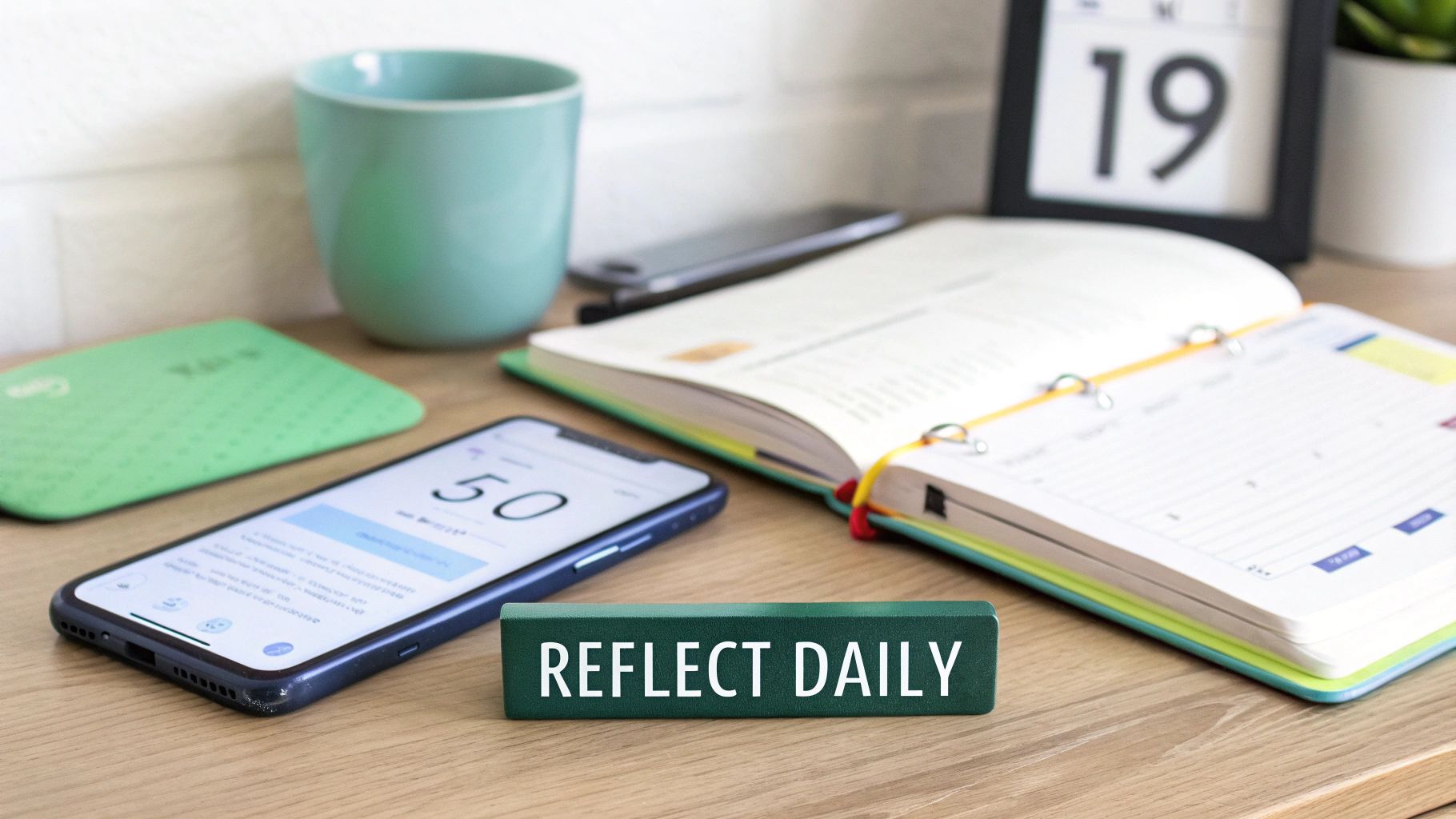
Have you ever wondered what people mean by "reflective practice" in healthcare? In short, it’s a structured way for professionals like you to pause, look back at your experiences, and figure out how to do things even better next time. It’s about consciously thinking about what happened, what you learned, and what you’ll change in the future.
This simple but powerful process turns tough shifts and complex patient interactions into valuable opportunities for growth, helping you become a more skilled and resilient practitioner.
What is Reflective Practice in Healthcare?

Let’s cut through the jargon. Think of a sports team reviewing game footage. They don’t just re-watch the match; they analyse specific plays, decisions, and outcomes to sharpen their strategy for the next game. That's exactly what you do in a healthcare setting. You connect the theory you've learned to what happens on the ward or in the community, sharpening your clinical judgment and ultimately improving patient care.
This is much more than just thinking about your day on the drive home. It’s an intentional, analytical process. For example, instead of just thinking, “that was a difficult conversation with a patient's family,” a reflective practitioner asks structured questions:
-
What exactly made that conversation so difficult?
-
How did my communication style influence the outcome?
-
What could I try differently next time for a better result?
A Core Professional Requirement
In the UK, reflective practice isn't just a good idea—it’s a fundamental part of your professional life. The Health and Care Professions Council (HCPC) sees it as a continuous process where you critically analyse your decisions against your knowledge to improve patient care. You can see examples of these standards on the British Dietetic Association website.
This structured approach is vital for maintaining high standards. It helps you spot gaps in your knowledge, build emotional resilience, and adopt a mindset of lifelong learning. To make sense of this, let's break down the core components that transform an experience into a moment of genuine learning.
Core Components of Reflective Practice
This table breaks down the essential elements that turn everyday experience into powerful professional learning.
| Component | What It Means in Your Daily Practice |
|---|---|
| Experience | This is the raw material – a specific event, a conversation, or a clinical task you performed. |
| Observation | Stepping back and looking at the situation objectively. What actually happened, without judgement? |
| Analysis | Asking "why?" This is where you connect the dots between your actions, the outcomes, and underlying theories or policies. |
| Action Planning | The crucial final step. Based on your analysis, what will you do differently next time? This makes reflection active, not passive. |
By consistently applying these steps, you build a robust framework for continuous self-improvement, ensuring your practice evolves and strengthens over time.
By looking back on your actions and their consequences, you create a powerful feedback loop for self-improvement. It allows you to learn from both your successes and your mistakes in a safe, constructive way, which is especially useful when providing care in adult social care settings.
Understanding its principles is a fundamental skill for anyone serious about a career in this sector. We've explored this topic in our article asking if reflective practice is useful in adult social care. Preparing for a degree with a course like the Access to Higher Education Diploma (Health and Social Care) can equip you with these essential skills right from the start.
Why Reflection Is a Cornerstone of Modern Healthcare
So, why is this deliberate process so important in healthcare? Simply put, reflective practice is your personal system for quality control and career-long growth. It’s the difference between just having a tough day and actively learning from it to become a safer, more effective practitioner.
One of the biggest impacts is on patient safety. In a field where the stakes are high, reflection gives you a structured, blame-free way to analyse mistakes or near-misses. It allows you to unpack what went wrong in a challenging situation and, more importantly, figure out how to stop it from happening again. This isn't about pointing fingers; it’s about building a culture of continuous improvement.
Enhancing Your Clinical and Personal Skills
Beyond safety, regular reflection is a powerful tool for sharpening your clinical abilities and boosting your resilience. When you analyse complex cases, you deepen your understanding of conditions and fine-tune your skills. Reflective practice is what helps you navigate tricky situations and improve your judgment, enabling you to better master decision making under uncertainty.
The benefits also extend beyond the technical side of the job. Healthcare is demanding, and the emotional toll can be huge. Reflection offers a vital space to process difficult experiences.
By regularly analysing challenging situations, you build resilience and develop coping mechanisms that help prevent burnout—a critical factor in sustaining a long and fulfilling career.
This process also makes a real difference in how you interact with others. When you stop to think about your communication style, you become more aware of how you’re coming across to patients and colleagues. This self-awareness leads to:
-
Stronger Teamwork: Understanding your own role helps you collaborate more effectively.
-
Better Patient Rapport: Thinking back on interactions helps you build greater empathy and trust.
-
Clearer Communication: It helps you spot and overcome barriers to good communication.
A Formal Requirement for Career Progression
In the UK, reflective practice isn't just a suggestion; it’s formally embedded in your professional obligations. Regulatory bodies like the Nursing and Midwifery Council (NMC) and the Health and Care Professions Council (HCPC) require it as evidence for revalidation.
Your reflective notes are a crucial part of your professional toolkit for:
-
Continuing Professional Development (CPD): They provide proof of your commitment to lifelong learning.
-
Annual Appraisals: They show your manager how you’ve grown and adapted your practice.
-
Revalidation: They form a core part of the portfolio you submit to keep your registration active.
Getting to grips with this skill is fundamental to building a successful career. If you're aiming to enter this sector, understanding these professional standards from the start gives you a huge advantage. The Access to Higher Education Diploma (Health and Social Care) from Stonebridge Associated Colleges is designed to provide this essential foundation.
With flexible, 100% online study and the ability to pause or cancel your subscription at any time, it’s a convenient and affordable way to prepare for a university degree and a successful career in healthcare.
Proven Reflective Models You Can Use
The idea of 'reflecting' can feel a bit vague. How do you go from just thinking about a tough shift to actually learning something? This is where established reflective models come in. Think of them as a roadmap for your thoughts, giving you a clear structure to turn messy experiences into powerful learning opportunities.
Instead of letting your day swirl around in your head, these frameworks give you specific prompts to ask yourself. They help you understand not only what happened but why it happened and, crucially, what you’ll do differently next time.
Gibbs' Reflective Cycle: A Step-by-Step Guide
One of the most popular models is Gibbs' Reflective Cycle (1988). Its circular design reinforces the idea that learning is a continuous process, where every experience feeds into the next.
Let's walk through it with a clinical scenario:
-
Step 1: Description – What happened? A patient became distressed and confused during the evening medication round. You struggled to calm them.
-
Step 2: Feelings – How did that make you feel? You might have felt stressed, flustered, or worried you weren't handling the situation well.
-
Step 3: Evaluation – What went well and what didn't? You stayed with the patient and kept them safe (good). However, your attempts to reassure them seemed to make things worse at first (not-so-good).
-
Step 4: Analysis – Why did it happen? Perhaps the ward was noisy, and you were rushing. You then remember their care plan mentions they respond better to quiet, slow communication.
-
Step 5: Conclusion – What else could you have done? You could have moved the patient to a quieter area or asked a colleague for help sooner.
-
Step 6: Action Plan – If this happened again, what would you do? Next time, you’ll check the environment first, approach calmly, and feel more confident asking for support earlier.
Following a process like this pushes you toward creating a solid plan for improvement.
Other Powerful Frameworks to Consider
While Gibbs is a fantastic starting point, other models offer different perspectives.
Kolb's Experiential Learning Cycle (1984) is another classic. It flows from having an experience to observing it, forming new ideas, and finally trying out what you’ve learned. It's all about the 'learn-by-doing' cycle.
Then there’s Donald Schön's model, which introduces two key concepts for thinking on your feet:
-
Reflection-in-action: Thinking while you're in the middle of a situation and adjusting your approach in real-time.
-
Reflection-on-action: Looking back at the event once it’s over, similar to Gibbs' cycle.
This infographic helps visualise the core benefits of using these models in a healthcare setting.

As the image shows, reflection directly boosts patient safety, sharpens clinical skills, and builds personal resilience. These principles are also critical in related fields; you can discover more about being what is a reflective practitioner of counselling in our related guide.
Comparing Key Reflective Models
A side-by-side look at popular frameworks to help you find the one that fits your style.
| Model | Best For | Key Stages |
|---|---|---|
| Gibbs' Reflective Cycle (1988) | A detailed breakdown of a specific event, great for building a clear action plan. | 1. Description |
| 2. Feelings | ||
| 3. Evaluation | ||
| 4. Analysis | ||
| 5. Conclusion | ||
| 6. Action Plan | ||
| Kolb's Experiential Learning Cycle (1984) | Understanding the learning process itself, focusing on how we learn from experience. | 1. Concrete Experience |
| 2. Reflective Observation | ||
| 3. Abstract Conceptualisation | ||
| 4. Active Experimentation | ||
| Schön's Model of Reflection (1983) | Experienced professionals who need to think on their feet, valuing intuitive thinking during a task. | 1. Reflection-in-action (thinking while doing) |
| 2. Reflection-on-action (thinking after the event) |
Ultimately, the 'best' model is the one you will consistently use. Try a few and see which feels most natural. The goal is to build a habit of deeper, more effective learning from your day-to-day experiences.
How to Build a Reflective Practice Habit

Knowing you should reflect is one thing; finding the time and energy is another. The secret isn't carving out huge chunks of time you don't have but weaving small, consistent actions into your routine.
Building any habit starts with making it easy. Forget aiming for an hour-long session. Instead, try blocking out just 15 minutes in your calendar at the end of each week. That small, protected window is far more sustainable and will do more for your growth in the long run.
Make It Effortless to Start
The best reflection tool is the one you’ll actually use. You don’t need a fancy journal if that’s not your style. There are plenty of practical alternatives.
-
Go Digital: Apps like Notion, Evernote, or even the notes app on your phone are perfect. They’re searchable, secure, and always with you.
-
Try Voice Notes: Record your thoughts on your commute home. Talking through an experience out loud can be a powerful way to process it without staring at a blank page.
-
Use Simple Prompts: Starting with a template or a few consistent questions can guide your thoughts and remove that initial friction.
It’s crucial to get past common barriers. A study involving International Medical Graduates found that the time-consuming nature of documentation and the feeling of it being a forced requirement were major challenges. You can read the full research about their experiences to see these hurdles. The key is to make your practice personal and genuinely useful to you.
Powerful Questions to Kickstart Your Entries
To make your reflections meaningful, go beyond just describing what happened. The goal is to analyse the situation and plan for the future. Asking the right questions can unlock deeper insights.
Instead of just asking, "What did I do?", try these powerful prompts:
-
What was the most challenging part of this situation for me, and why?
-
How did my own values or assumptions influence how I acted?
-
What knowledge or skill gap did this experience highlight?
-
If a colleague were in this situation, what advice would I give them?
-
What is the single most important lesson I can take away from this?
-
What one small change will I make in my practice as a result of this?
These questions push you to think critically about your performance and mindset, which is the heart of effective reflective practice.
Tackling Common Challenges
It's easy to get stuck. The biggest hurdles are often the fear of being too self-critical and the worry that you just don't have time.
Acknowledge Progress, Not Just Problems: Reflection isn't only about finding faults. Make a conscious effort to note what went well. Celebrating small wins builds confidence and stops the process from feeling negative.
To deal with the time issue, start small. Genuinely, even a five-minute reflection at the end of a shift can be incredibly valuable. Consistency is far more important than the length of each session. By making reflection a simple, structured part of your professional life, you turn it into one of your most powerful assets for career-long learning.
Connecting Reflection to Your Career Advancement
Reflective practice is far more than a personal development tool; it’s a vital part of your career in the UK healthcare system. Think of your reflective notes not just as a private diary but as powerful, tangible evidence of your competence, growth, and commitment to high standards.
Your reflective journal acts as a formal record of your professional learning. It’s the bridge connecting your day-to-day experiences with the formal requirements of regulatory bodies. When appraisal or revalidation time comes, these reflections are exactly what you need to show how you’re meeting professional standards.
Fueling Your Professional Portfolio
Your reflective entries are the backbone of your Continuing Professional Development (CPD) portfolio. Professional bodies like the NMC and HCPC want to see that you are actively learning from your practice, not just listing courses you’ve attended.
Your reflective writing provides concrete proof of your learning journey. It shows how you've analysed challenging situations and adapted your approach to improve patient outcomes, making it one of the most compelling parts of your portfolio.
This evidence is critical for revalidation, a process every registered healthcare professional must complete to maintain their registration. Without a strong portfolio filled with reflective evidence, meeting these mandatory requirements is incredibly difficult.
Embedded in Healthcare Training
The importance of this skill is recognised from the very start of a healthcare career. Institutions like the NHS embed reflective tasks directly into their training programmes. For example, the National School of Healthcare Science (NSHCS) makes reflective writing a core assessment for trainees.
This shows that mastering reflection is a non-negotiable skill that proves you can grow and adapt. It's also a key ingredient in your own professional growth; if you want to dive deeper, our guide explains how to write a personal development plan. Tying your reflections to your career goals can be a game-changer when you want to advance your career as a medical scribe or take on another role in healthcare.
Paving the Way for Your Future in Healthcare
Getting to grips with reflective practice early on gives you a significant advantage. If you're considering a career in this sector but don't have A-Levels, the Access to Higher Education Diploma (Health and Social Care) is the perfect starting point. This online course, offered by Stonebridge Associated Colleges, is equivalent to three A-Levels and is designed to get you ready for university in under a year.
With Stonebridge, you can study 100% online with a flexible subscription model that you can pause or cancel anytime. It's a convenient and cost-effective way to gain the foundational knowledge and skills—including the principles of reflection—that are essential for a successful career in health and social care.
Looking to Start Your Healthcare Journey?
Building professional skills like reflective practice starts with the right education. If you're inspired to pursue a university degree in health or social care but don't have the necessary A-Levels, an Access to Higher Education Diploma could be your perfect first step.
This nationally recognised qualification is your launchpad into a rewarding healthcare career. Seen as the equivalent of three A-Levels, the diploma is designed to prepare you for degree-level study in less than a year. It’s a fantastic route for adult learners who are passionate about making a difference and want to gain the essential knowledge fundamental to modern healthcare.
What You Will Learn
This diploma is built to give you the confidence and skills to thrive. You’ll get to grips with crucial topics that form the bedrock of excellent patient care, such as:
-
Healthcare Communication: Learn vital techniques to connect with patients and colleagues.
-
Developmental Psychology: Gain a solid understanding of human behaviour and development.
-
Equality and Diversity: Master the principles of inclusive practice to support people from all walks of life.
These subjects provide the practical, real-world understanding needed to handle situations with empathy and skill, preparing you to succeed at university and in your future career.
Flexible Online Learning with Stonebridge
The Access to Higher Education Diploma (Health and Social Care) from Stonebridge Associated Colleges offers a flexible and affordable way to reach your goals. With over two decades of experience, Stonebridge delivers career-focused courses perfect for adult learners.
The course is delivered 100% online, giving you the freedom to study around your existing work and life commitments. This modern approach puts you firmly in control of your learning journey.
Stonebridge offers a convenient subscription model, so you can learn at your own pace. You can pause or cancel at any time, giving you financial flexibility without being tied into long-term credit agreements. With one-to-one support from qualified tutors and instant access to all your course materials, you'll have everything you need to succeed.
Start today and take that first step towards a truly rewarding career helping vulnerable people and making a lasting impact.
Your Questions About Reflective Practice Answered
Once you start digging into what reflective practice means for you, a few practical questions often pop up. It’s completely normal to wonder about the nuts and bolts of putting this theory into action. This section gives you clear, straightforward answers to help you get started with confidence.
How Is Reflection Different from Just Thinking About My Day?
This is a great question. While thinking about your day is often casual and unstructured, reflective practice is intentional and structured.
Thinking is passive; reflection is active. When you reflect, you use a framework—like Gibbs’ cycle—to systematically break down an experience. It has a specific purpose: to learn from what happened and create a clear plan to improve next time. It’s the difference between a casual daydream and a focused debrief.
Can My Reflective Notes Be Used Against Me Legally?
This is a common and understandable worry. The good news is that UK professional bodies like the NMC and HCPC are clear that the point of reflection is for learning, not for assigning blame.
That said, it’s always wise to protect yourself and maintain confidentiality. Best practice is to:
-
Focus on what you learned, not on pointing fingers.
-
Keep your entries anonymous by removing names or identifiable details of patients or colleagues.
-
Discuss the general principles and lessons learned rather than specific, incriminating details.
How Often Should I Be Doing This?
The simple answer is that consistency matters more than frequency. The key is finding a routine you can stick with. Trying to force a marathon reflection session every day is a recipe for burnout.
Instead, find a rhythm that works for you. Maybe it's a short 15-minute reflection at the end of each week or a deeper dive after a particularly challenging event. The aim is to build a sustainable habit that feels helpful, not like another daunting task on your to-do list.
Ready to build the foundational skills for a successful career in health and social care? Stonebridge Associated Colleges offers the online Access to Higher Education Diploma (Health and Social Care) to prepare you for university. With flexible subscription options and 100% online learning, you can start your journey today. Learn more at https://www.stonebridge.uk.com.




